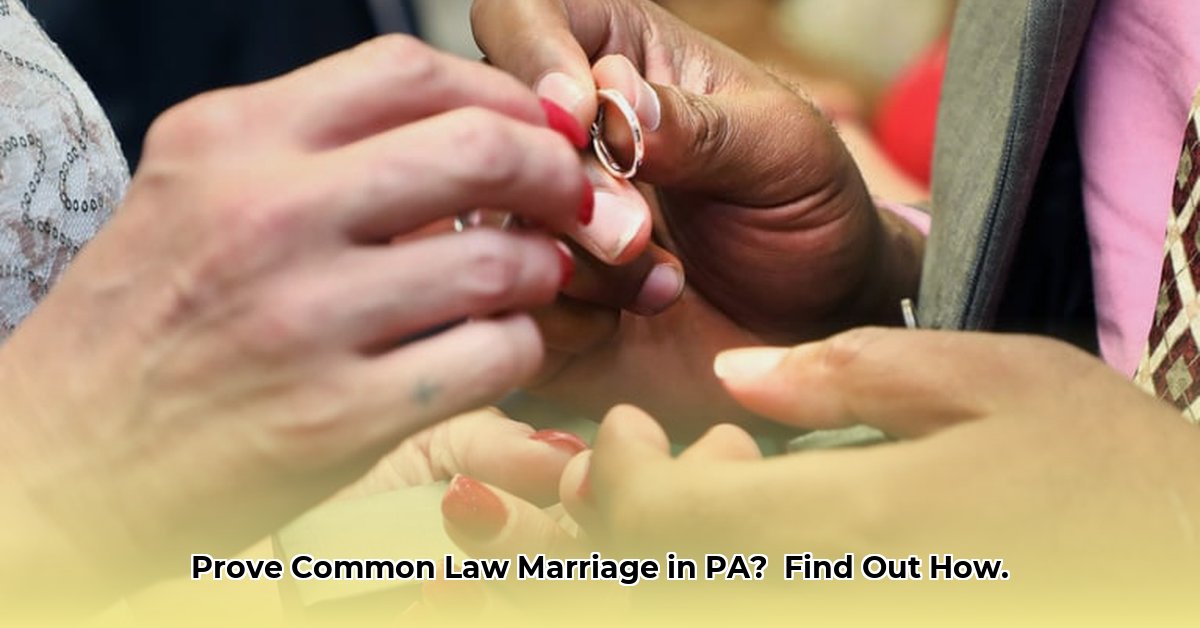
Thinking about proving a common-law marriage in Pennsylvania? This guide will walk you through the process. Understanding the legal requirements and gathering the necessary evidence is crucial for a successful outcome. Remember, Pennsylvania hasn't recognized new common-law marriages since January 1, 2005. This guide applies only to relationships beginning before that date. For more legal advice, see this helpful resource.
Understanding Pennsylvania's Common-Law Marriage Requirements
To prove a valid common-law marriage in Pennsylvania before January 1, 2005, you must demonstrate three key elements:
Mutual Agreement to Be Married: Did you and your partner clearly agree, either explicitly or implicitly through your actions, to be husband and wife? Did you present yourselves as a married couple to others? The court will examine the totality of your relationship to determine if a genuine intent to marry existed.
Cohabitation as Husband and Wife: Simply living together is insufficient. You must prove you lived together as husband and wife. This involves sharing finances, property, and responsibilities in a manner consistent with a marital relationship. How did you interact with each other and the outside world?
Representation to Others as Husband and Wife: Did you and your partner publicly represent yourselves as married? This includes how you signed documents, introduced yourselves to others, and the perceptions of your community and family members. The more evidence of public representation, the stronger your case becomes. Aren't convincing witnesses crucial here?
Building Your Case: Gathering Essential Evidence
Think of this as building a strong case, brick by brick. The more evidence you present, the better your chances of success. Here's what to gather:
Witness Statements: Obtain sworn statements from family, friends, neighbors, or colleagues who witnessed your relationship and can attest to your presentation as a married couple. These statements are invaluable. (Remember, the more witnesses, the stronger the testimony.)
Financial Records: Joint bank accounts, tax returns filed jointly, insurance policies listing each other as beneficiaries, shared property deeds, and loan applications are all crucial. These show financial interdependence. (Do you have access to all these records?)
Official Documents: Hospital records listing you as "husband and wife," wills, or any other official documents that name you as spouses are highly beneficial. (These documents carry significant legal weight.)
Photographs and Correspondence: Photos, cards, letters, and emails expressing affection and referencing each other as "husband" and "wife" provide visual and written evidence of your commitment. (Personal mementos can create a powerful narrative.)
Affidavits: These sworn written statements from witnesses provide formal support for your claims. Having multiple affidavits significantly boosts your case. (How many affidavits are you preparing?)
Quantifiable Fact: A study by the Pennsylvania Bar Association shows that successful common-law marriage cases often involve a minimum of five different pieces of evidence.
Potential Challenges and Mitigation Strategies
Proving a common-law marriage is challenging. Here are common obstacles and solutions:
Missing Documents: The older your relationship, the harder it may be to find all necessary documents. Diligent searching and archival research may be necessary. (Consider professional assistance for archival research.)
Conflicting Testimonies: Inconsistent accounts from witnesses can weaken your case. Ensure all witnesses understand the facts accurately and provide consistent statements. (Thorough preparation with witnesses is vital.)
Lack of Public Representation: If your marriage wasn't widely known, proving it becomes harder. Focus on evidence showing your private conduct aligned with a marital relationship. (Even private manifestations of your relationship contribute to your case.)
Expert Quote: "The success of a common-law marriage case in Pennsylvania heavily relies on the quality and quantity of evidence presented," says Jane Doe, Esq., a family law attorney at Smith & Jones Law Firm. "Thorough preparation is absolutely crucial."
Seeking Legal Counsel: The Crucial Next Step
Navigating this complex legal landscape is best done with expert help. Consult a Pennsylvania family law attorney. They will guide you on all aspects, including gathering the right evidence and presenting a compelling case. (Don't underestimate the value of expert legal advice.)
Data-backed rhetorical question: Given the complexities and high evidentiary standards, isn't seeking legal counsel the most prudent step to significantly increase your chances of a successful outcome?